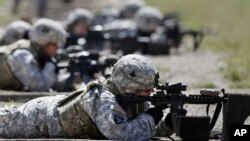Islamic State (IS) appears to be losing its grip in Afghanistan, due in part to a steady aerial bombardment from U.S. and NATO forces and the terror group's failure to win over Afghans themselves.
"Nobody really wants Daesh [Islamic State] in the neighborhood," Brigadier General Charles Cleveland, a spokesman for the NATO-led Resolute Support Mission, told Pentagon reporters Thursday via a video link from Afghanistan.
"We think we have significantly decreased the footprint that they have in Afghanistan," he said.
The U.S. military estimates there are between 1,000 and 3,000 IS fighters left in Afghanistan, though Cleveland said the actual number is "probably on the lower end of that."
Shrinking territory
Three months ago, IS held between six and eight districts, he said. Now it holds just two to three.
IS fighters have been seen fleeing to the Kunar and Nuristan provinces along Afghanistan's western border with Pakistan, where they are just "trying to survive," Cleveland said.
Though precise numbers are hard to come by, US and Afghan military commanders in Afghanistan are also beginning to see members of IS defect to the Afghan government or to the Taliban.
Cleveland said IS forces left in Afghanistan are mostly "disaffected" Pakistani and Afghan Taliban, or remnants of the Islamic Movement of Uzbekistan.
Threat remains
Through the first three months of 2016, NATO has hit IS fighters with between 70 and 80 airstrikes. But while it has taken a toll, Cleveland cautioned that the militants still "present the potential to be an enormous threat."
"They've got the ability to really catch fire," he said.
Despite setbacks, the Afghan military is also successfully putting pressure on IS and working to bolster its ranks.
The Afghan National Defense and Security Forces lost about 5,500 troops last year, but held together; and Cleveland said he is expecting them to go on the offensive against both the Taliban and IS this year.
"The [Afghan] military did not collapse,” Cleveland said. “While they certainly took some hits, they were able to keep themselves together. So we don't have a Mosul here in Afghanistan. We don't have a Ramadi or a Fallujah or anything like that."













